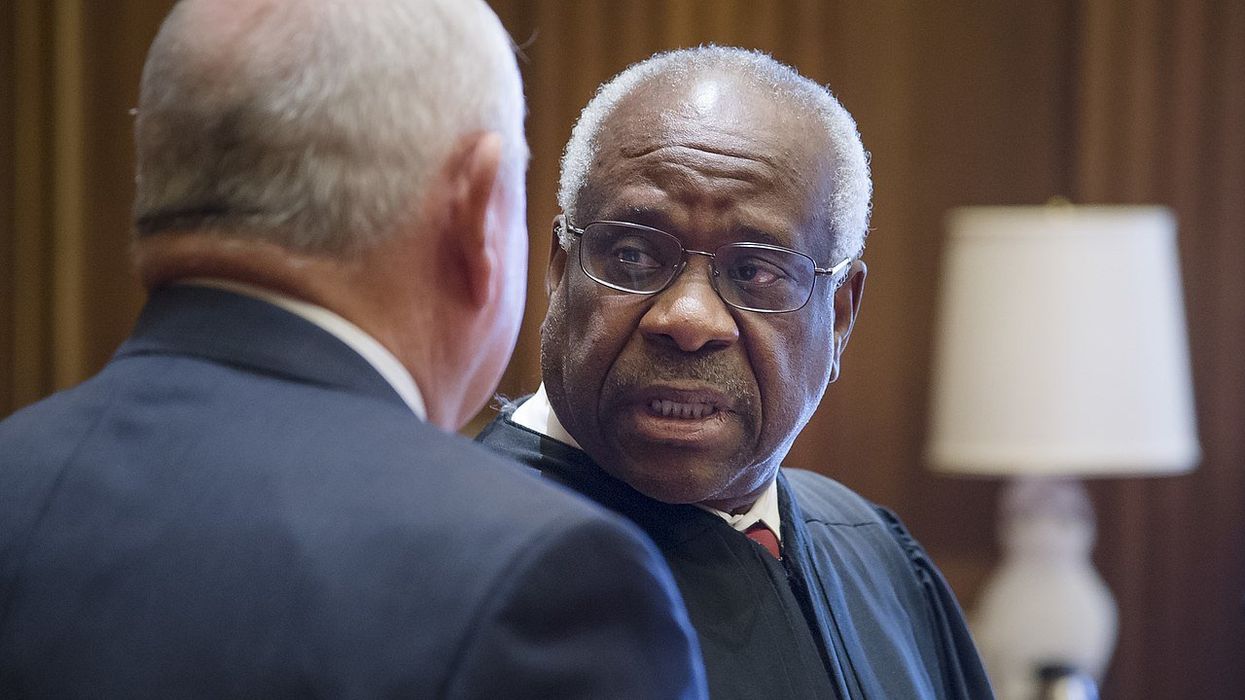A 'novel' opinion would 'rewrite civil rights in the image of Kris Kobach.' These justices will likely endorse it

U.S. Supreme Court Justice Clarence Thomas in 2017 (Creative Commons)
November 22, 2023 | 02:57PM ETBank
Right-wing justices on the U.S. Supreme Court haven't outright overturned the Voting Rights Act of 1965, which was signed into law by President Lyndon B. Johnson 58 years ago. But they have been gradually chipping away at and undermining it.
The Voting Rights Act has also been under attack from right-wing judges in the lower federal courts via various cases. One such ruling recently came in the case Arkansas State Conference NAACP v. Arkansas Public Policy Panel.
In that case, Slate's Jay Willis reports, a three-judge panel for the U.S. Court of Appeals for the 8th Circuit "reached the novel conclusion that only the federal government — specifically, the attorney general — can enforce Section 2 of the Voting Rights Act."
POLL: Should Trump be allowed to hold office again?
The opinion was written by a Donald Trump appointee (David Stras) and a George W. Bush appointee (Raymond Gruender).
"Stras' opinion, if the Supreme Court allows it to stand, is as disastrous for the future of multiracial democracy as it is useful to the conservative legal movement's policy agenda," Willis explains in an article published on November 21. "Private parties have used Section 2 to bring just about every voting rights case in recent memory. That has been especially true since 2013, when the court in Shelby County v. Holder effectively invalidated Section 5 of the act, which had, until then, been its most robust enforcement mechanism, requiring Department of Justice preclearance to voting changes in certain jurisdictions."
Willis notes that the case is "likely to make its way to the Supreme Court," and he expects Justice Clarence Thomas — a dissenter in Allen v. Milligan — to agree with the Stras/Gruender ruling. Allen v. Milligan was the 5-4 Roberts Court ruling that struck down a GOP-designed congressional map in Alabama as discriminatory against Black voters. And Thomas, Willis argues, "has spent his entire career working to hollow out the (Voting Rights) Act."
"The good news…. is that I do not think Stras' argument will find a receptive audience," Willis predicts. "Thomas might like it, and perhaps Justice Neil Gorsuch, who included a similar just-asking-questions line about Section 2 in….. Brnovich v. DNC two years ago. Given how many glowing headlines Roberts and company earned from Allen v. Milligan, though, I sort of doubt that the Court allows two random appeals court judges to rewrite civil rights law in the graven image of Kris Kobach."
READ MORE: These Clarence Thomas 'patrons' underscore the need for a Supreme Court 'code of ethics': analysis
Slate's full report is available at this link.